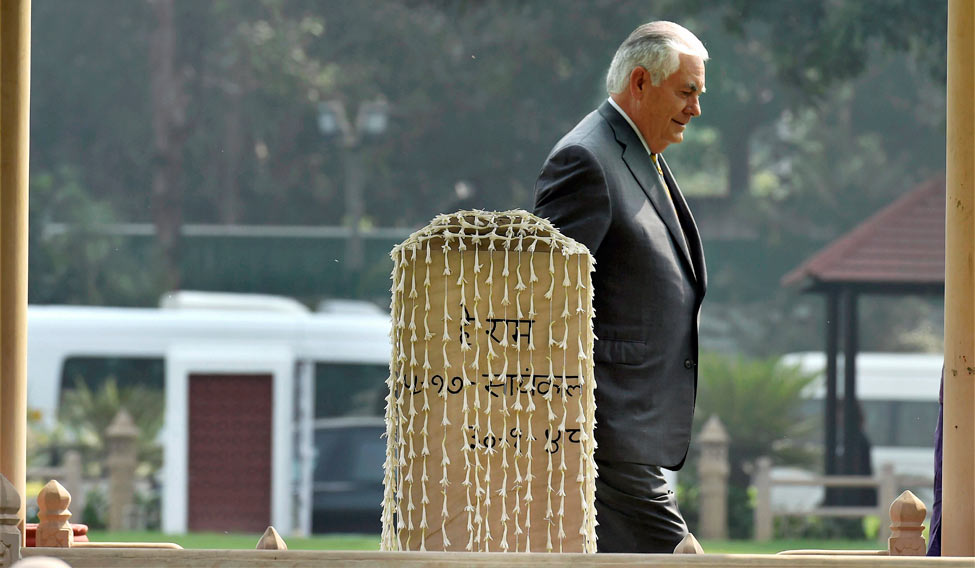US Secretary of State Rex Tillerson’s India tour in the wake of President Donald Trump’s new Afghan strategy that suggests bigger Indian role in the war-torn country contrary to years of opposition to India’s active role there, has generated lot of hope and optimism in Delhi. Tillerson, during his maiden visit to India while meeting Prime Minister Narendra Modi, Minister of External Affairs Sushma Swaraj and National Security Advisor Ajit Doval discussed issues of “strengthening Indo-US partnership, India’s leadership on peace and security in the Indo-Pacific region, and its vital role in Trump administration’s South Asia strategy”. It is essential two democracies work together to address challenges facing both of them.
After Soviet disintegration accompanied by end of cold war rivalry, all of India’s bid to improve ties with US had utterly failed. However, US after realising India to be huge market for its products, particularly military hardware, has displayed interest to strengthen ties with India since 2005 when both countries signed the historic defense framework agreement. Since then, ties between the two largest democracies have been growing fast. The other US objective in strengthening ties with India is to meet challenges of China’s unprecedented rise in Indo-Pacific region and help resolve Afghan issue.
What we should not lose sight of is that US has never treated any country, not even its most important ally—Great Britain—as equal partner. So the unequal partnership with Washington may force India to pay heavy price in terms of influencing our relationship with third countries negatively. India’s strategic autonomy in the domain of foreign policy should not be compromised at any cost for the sake of our partnership with US, as it was done, for instance in case of Iran, when we backed out from Iran-Pakistan–India pipeline project and supported the US move to take Iranian nuclear issue to the UN under blatant US pressure .
Our growing partnership with US is no doubt welcome but it should not be permitted to happen at the cost of our relationship with other strategic partners like Russia. Though Moscow officially does not object to India’s growing partnership with Washington, it does have misgivings about it. It is not an accident that strengthening of our partnership with US since 2005 coincided with deterioration of ties with our time-tested friend—Moscow. It is also no accident that this period witnessed improvement of ties between Russia and Pakistan though Moscow never said it openly. This is a fall out of India’s bid to strengthen strategic ties with Washington at its cost. But discussions in Russian think tanks and analysis by Russian scholars do emphasise that relations with Pakistan should be used as a leverage to prevent Indo-US relations growing to the disadvantage of Moscow.
India has serious reservations about Moscow promoting ties with Pakistan, establishing defense cooperation and holding joint military exercises with it. Russia-Pakistan joint military exercise Druzba and Moscow’s willingness to sell helicopters raised lot of heat and dust in India. Some of Indian media went to the extent of stripping Russia of the status of special and privileged strategic partner. If India wants to prevent these developments, Delhi has to be mindful to some of Russia’s concerns. Indo-Russian special and privileged strategic partnership has to be based on convergence of long-term national interests and on the principle of give and take.
The argument that Moscow does not have any potential to help us in any way to emerge as a global power is misplaced. If any major country is sincerely supportive of our rise as a global power, it is Russia. It was the first major power to support India’s aspirations to be a permanent member of the reformed UN Security Council, whereas US's position so far on the issue is ambiguous at the best.
We should not forget that the positive outcome for India in the latest BRICS summit held in China where Pak-based terror outfits were for the first time mentioned in the grouping’s resolution is a result of Russian effort. Russia played no less positive role in resolving the Doklam faceoff with China in order to make the BRICs summit a success. If any country has made any serious contribution to India’s Make in India programme, it is Russia, which had helped us in industrialising India in the past.
Another irritant in the Indo-Russian partnership is differences on Afghanistan and Russia’s Pak ties, which have been simply blown out of proportion by the media. We are very comfortable with some of our strategic partners that have much larger relationship with Pakistan. That is why India’s knee-jerk reaction to Moscow’s growing but limited ties with Islamabad and to deprive Russia of India’s special and privileged strategic partner status is unwanted and misplaced. India cannot simply afford to ignore or neglect the unique strategic partnership with Russia.
Arun Mohanty is a professor at Center for Russian and Central Asian Studies, School of International Studies, JNU




